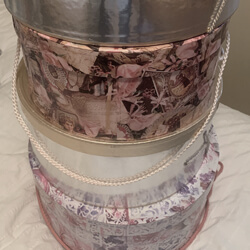Nonfiction:
In my seventh decade I’m starting over. I come from four generations (perhaps more—one can see only so far into the dim past) of keepers. There are boxes filling my garage that my parents loaded out of my grandmother’s house when she died; that my sister and I loaded out of my mother’s house when she died; and that now rest in various places in my house: in closets, on high shelves, on low shelves, under beds, in cupboards, and in a solid volume where my Volvo wagon should be.
I’m opening them now, these past days, in order to take most of their contents to the Washington State Historical Society in Tacoma where ephemera director Ed Nolan will, I hope, find a home for food ration coupons from the war; immigration papers as my grandma’s family left Galt, Canada for the States; shares for Seattle’s Chinook Iron Company owned by my great uncle Percy; grandma’s diaries from the 30s and 40s; a yearbook from Spokane High School dated 1937, etc. You get the drift.
But that drift caught me like a whirlpool, has pulled me down for years as I’ve moved boxes and suitcase of photographs, and papers, and notebooks, and scrapbooks, and newspaper clippings from one place to another. And now they pull me further into my past, into a past that is not even mine, in fact, because I didn’t exist yet.
I’m both starting over and walking backwards in time: here’s my mother posing flirtingly, stunningly from a car window; and my father, with other officers on the WWII transport SS Cape Cleare, his hat at a jaunty angle. I look at them now and I see where I came from. No, I see the impossibly indescribably unknowable—how did I arise from these two young people?
Is it the pandemic that has shifted my thinking? Partly. Though with or without the virus, my mortality creeps closer to me. I begin to feel the weight of these years; and the real world weight of these boxes that I now lift, move, open, and sort through.
How do I know I’m starting over? Because I ordered a garbage can. One of those big, heavy plastic rolly ones that tend to tip over unless they’re full. And I am filling it, every week, starting first with my own past: reports, books, pictures of forgotten places and friends, my random ephemera in file boxes, drawers, cabinets.
Day by day I find myself battling that keeper gene, that the-minute-you-throw-it-away-you’ll-need-it fear, that don’t waste anything attitude. I’m trying to forgive myself for not rewashing every Ziploc bag. If something is broken I don’t automatically think, “What else can I use this for?” Or stash it somewhere for repair later. I—gasp—sometimes throw it away. And that simple act—acknowledging that things can be left behind, that objects, even objects trailing wisps of history and emotion, need not be saved—is revelatory. This is (hesitantly) the new me.
On the existential front, I’m learning that I will survive without clutching at my past. I don’t need to carry it with me as I enter the future. Who I am was created in the caldron of days gone by (now represented by stuff), yet here I am, fully-formed, a whole functioning product. Will I need, ever again, the grade sheets for students I had in my Ca2000 class on international strategic business planning at Ecoles des Hautes Etudes Commerciales outside of Paris. I’m pretty sure not.
But it’s not that I’m a closed book: my last page has not been written. It’s not that I can’t be added to, but I expect future transformations and transfigurations and, even, transmogrifications not to require a suitcase.
Cate Gable is a Washington native who now lives in Nahcotta on the Long Beach Peninsula. For the last 15 years, she has written a weekly column for the Chinook Observer in Pacific County, and has recently published work in the magazines: Raven Chronicles; Bryant Literary Journal; Rain; Washington 129; LitFuse @10; Rattle and others. She holds an MA from the University of Washington and an MFA in poetry from Pacific Lutheran University.


